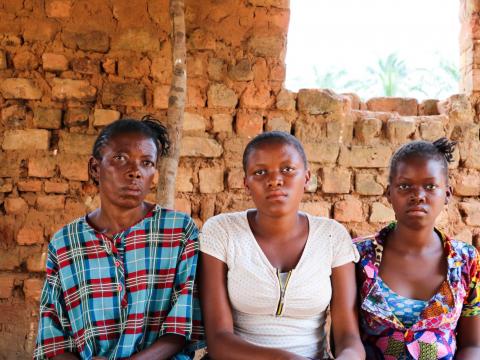Fleeing from Tshikapa to Dibaya to escape ethnic violence in the DRC | Maria and Joelle tell their story

At the height of the crisis in the Kasai provinces of central DRC, 1.6 million people fled their homes. Most people in Kasai Central returned home in August and September, and have now begun rebuilding and planting crops for the first time in a year. As we drive the 100km to our distribution site in Dibaya from the office in Kananga, we pass baby piglets and waist-high maize growing along the sandy road.
However, families here are still adjusting. Incredibly impoverished but peaceful before the crisis, they’re now dealing with even sharper levels of need, and adjusting to the loss of fathers, brothers, and babies. Dibaya is once more relatively peaceful, but the violence that started here spread to all five provinces of the Grand Kasais. Once the epicenter of the conflict, Dibaya has recently become host to increasing numbers of families fleeing Tshikapa in Kasai, 500km away, where violence has taken on an ethnic note.
I met Maria at a food distribution World Vision was conducting, reaching displaced and returned families. Maria used to be a nurse until earlier this year when the conflict splintered her family and sent her fleeing.
“It was in March, towards the end,” she explained, speaking softly and quickly. “The war started that morning, very early in the morning. I had 10 children; they killed two and then I had just eight. Now I have eight children.”
Joelle has been sitting next to her Mum, listening to her explain. “They killed my two brothers at the forest at the border with Angola. They were 12 and eight. They burned our house. The armed men killed people. That’s why we fled.”
“When they’ve been killed like that, you just leave, you flee. There was no way to bury them or to do anything. That’s why I came here, with…” Maria pauses for a moment to collect herself, “…with all my children, after I lost my two children. We’ve lost everything.”
“Their father was there too, but he fled. I don’t know where he is now.” Maria adds.
The loss of her sons and husband was just the beginning of Maria’s journey with her daughters. The family spent two months walking the 350km towards Kananga in the forest, often encountering other families and villages seeking peace along the way.
“It wasn’t really a road, but there were many of us in the forest.” Maria explained.
“There was conflict, too. There was still war. The militias we met took everything that we’d managed to bring.”
“When I went to Kananga, I got seriously sick. With the cold, and getting money to have something to eat, life has been difficult.”
Maria and her girls stayed in Kananga for four months, but they were struggling and earlier this month travelled the additional 100km to their relatives’ house in Dibaya. Their relatives are elderly and in poor health, but Maria is adamant that they won’t be moving again…or ever returning home.
“I’m going to stay here,” She repeated. “Where I was they burnt our house. I don’t know where my husband is.”
The family lost all their papers in the fire, including Maria’s nursing certification. Until it’s replaced Maria can’t work, and without income, she can’t afford to send her children to school.
“I don’t go to school here,” Joelle explains. “We don’t have the money. During the day we go to the forest to search for food to eat.”
As I leave, I ask Joelle what she wants to do now. “Me, I want to study,” she says firmly.
“Not marry?” my colleague teases.
“No,” she says sharply. Joelle may have had a rough year, but she’s determined to get back into school and finish 5th grade. These women are down, but they’re fighting to get their future back on track.
“I’m still a nurse,” Maria smiles. “Even if I’ve lost lots of weight, I still have something in my head.”
As I’ve been speaking to Maria, a crowd has gathered. There are dozens of other families who’ve come here from Tshikapa, all fleeing ethnic violence, and all with a story to tell.